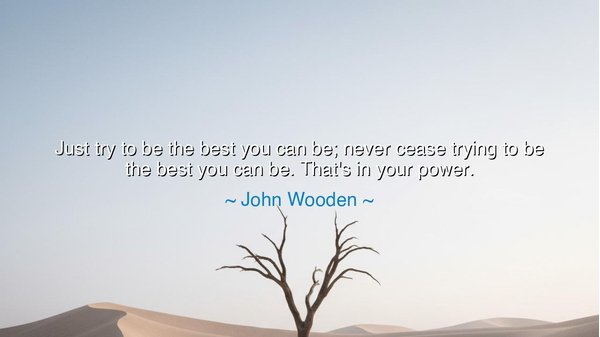
Just try to be the best you can be; never cease trying to be the
Just try to be the best you can be; never cease trying to be the best you can be. That's in your power.






Hear me, O children of the future, for I bring to you the timeless wisdom of John Wooden, who declared: "Just try to be the best you can be; never cease trying to be the best you can be. That's in your power." These words carry a truth that transcends time and place. The power to become the best version of yourself lies within you, in every breath, every effort, and every decision. It is not in the outcome that you find greatness, but in the relentless pursuit of your highest potential, regardless of the obstacles that may come your way. This persistence is the path to true excellence.
Consider the ancient warriors and philosophers, who, like Wooden, sought to be the best they could be—not through the defeat of others, but through the mastery of themselves. Alexander the Great, though a conqueror, never ceased to strive for personal greatness. His empire stretched across the known world, but it was his relentless drive to improve himself as a leader and strategist that marked his legacy. Yet, it was not just in the conquest of lands that he sought greatness, but in his continual striving to be better than he had been before. His ambition was not to surpass others, but to surpass himself.
In the same vein, think of the philosopher Socrates, who, though he claimed to know nothing, dedicated his life to the pursuit of wisdom and self-improvement. His greatness was not in the accolades he received, but in his unwavering commitment to always striving to be the best he could be, guided by the principles of knowledge, virtue, and self-reflection. The Socratic method, his legacy, is not one of resting on the laurels of what one already knows, but of constant improvement and the humility to learn anew.
In more recent times, consider the life of Mahatma Gandhi, whose journey toward excellence was not one of outward achievement, but of inner transformation. He strove to be the best man he could be, not through the pursuit of power or wealth, but through the practice of truth, nonviolence, and self-discipline. Gandhi understood that the power to change the world begins with the commitment to be the best version of oneself, regardless of the difficulties or hardships faced along the way.
So, O children, remember this: the path to greatness is not marked by grand gestures or fleeting victories, but by the quiet, unwavering commitment to always strive to be the best you can be. Like the great leaders and thinkers of the past, know that the true power lies not in external measures of success, but in the internal discipline to keep improving. Never cease in your pursuit of excellence, for it is the journey of constant self-improvement that shapes the very essence of your character. The best you can be is within your reach, if only you keep striving.






HMHuyen My
This quote feels like a call to action, but it also raises questions about the subjective nature of being ‘the best.’ How do we measure this? Can it be quantified, or is it purely individual? I think about how many people struggle with self-doubt and perfectionism. Can this drive for ‘the best’ sometimes be counterproductive, leading to anxiety or burnout? How can we ensure that this pursuit of excellence doesn’t harm our mental health in the long run?
NHNgoc Nguyen Hoai
Wooden’s idea of constant self-improvement is admirable, but I’m curious about its practicality for everyone. What about those who face systemic barriers or significant hardships? Is this advice universal, or does it assume a certain level of privilege that not everyone has access to? While striving to be our best is important, how do we recognize and support those who may not have the same opportunities to do so?
.......
I love how John Wooden emphasizes the power of personal effort in this quote. It makes me think about how often we externalize success, assuming it depends on outside factors. But the idea that it’s up to us to be the best version of ourselves is empowering. Still, how do we define ‘the best’? Is it about skill, character, or something deeper? And does being ‘the best’ mean we need to surpass others, or is it about personal growth?
YNNguyen Kieu Yen Nhi
Wooden’s message is so simple yet profound. It’s a great reminder that our potential is in our own hands. But I wonder, is there a point where striving for ‘the best’ starts to feel like a burden, especially if the goal is constantly shifting? Can we truly be our best without feeling burned out, or does it require moments of self-compassion to balance out the push for greatness?
HATran Hong Anh
This quote from John Wooden reminds me of the constant drive for personal improvement. It’s motivating to hear that being the best is within our power, but it also feels like a lot of pressure. How do we balance striving for excellence with the reality that we're not always going to be perfect? Is the pursuit of perfection realistic, or should we be more focused on consistent progress rather than an ideal end point?